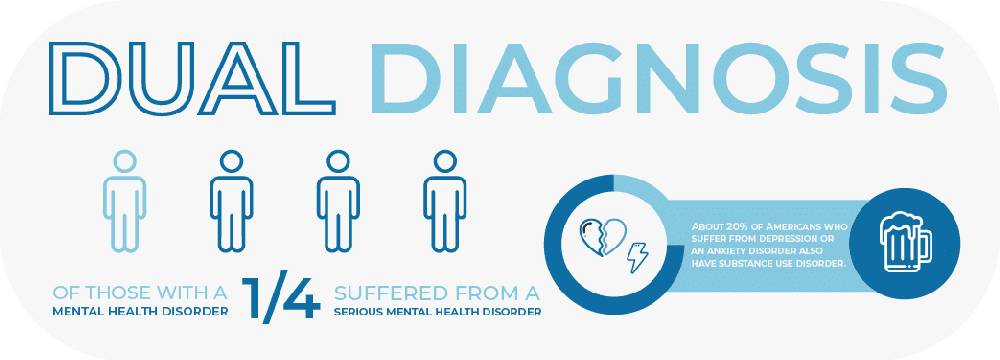 Addiction is extremely difficult to wrestle with. For some people, it’s intensified with the presence of other mental health disorders. Battling addiction along with mental health disorders makes a complicated situation more challenging. Yet, even if you are facing countless symptoms from conditions like depression, anxiety, and bipolar disorder, it is possible to build the healthy coping skills you need to avoid relapse.
Addiction is extremely difficult to wrestle with. For some people, it’s intensified with the presence of other mental health disorders. Battling addiction along with mental health disorders makes a complicated situation more challenging. Yet, even if you are facing countless symptoms from conditions like depression, anxiety, and bipolar disorder, it is possible to build the healthy coping skills you need to avoid relapse.
The right addiction treatment programs incorporate support for mental health disorders like these and others. Treating both at the same time is the most effective path to recovery. That’s why Casco Bay Recovery offers dual diagnosis treatment centers in Maine to address what you’re facing in a meaningful manner.
Connect with our Portland, Maine treatment center today to learn more about our dual diagnosis programs. You can call our team at 844.940.4407 or reach out online.
What is a Dual Diagnosis?
Dual diagnosis is what is referred to when someone is battling an addiction and a mental health disorder simultaneously. This sort of condition is quite common, unfortunately, as nearly 8 million individuals in the United States deal with a dual diagnosis. This is a rather large number, especially considering the fact that 20 million people struggle with addiction. This means nearly half of those suffering from an addiction also suffer from another mental health disorder.
Those who suffer from both a mental health disorder and an addiction probably do so for good reason; there is a severe lack of quality, affordable treatment available for mental health. As a result, people self-medicate to cope with their mental health disorders. How exactly? Most often, it’s with drugs and alcohol in copious amounts. This is extremely dangerous and has the potential to lead to a serious, severe addiction.
What Causes Someone to be Dually Diagnosed?
When someone is dealing with a mental health disorder and begins to cope by self-medicating, this increases the likelihood of developing an addiction. The same can also be said the other way around. There could be a plethora of causes for this, but the most obvious is also the most disappointing. Those who suffer from substance use disorders could be scared to get help because of how others might perceive them; these sorts of worries are completely valid, but can seriously influence mental health disorders like anxiety and depression.
When an individual’s substance use disorder gets progressively worse, their minds start to break. It is then that the development of an additional mental health disorder begins. On the other hand, those who already suffer from a mental health disorder can make it worse, but how? This can occur when someone becomes addicted to illicit (or even legal) substances of abuse.
What Are The Signs of a Dual Diagnosis?
Dual diagnoses can be difficult to identify. This is a big reason why it can unknowingly affect so many individuals. That’s also what makes the concept so frightening; a loved one could be suffering from a dual diagnosis and you or others might not even notice. It’s difficult to notice when you’re not looking, but when you are, the symptoms could include the following:
- Legal issues
- Mood swings
- Amplified emotions
- Loneliness
- Withdrawal from family and friends
- Hallucinations
- Distrust
- Paranoia
- Secretive behavior
- Inattentiveness
- Substance abuse withdrawal symptoms
How Can You Tell if Someone Has a Dual Diagnosis?

It can be difficult to tell when someone is suffering from two mental health disorders at once, but why is that? Shouldn’t it be simple to look at and identify the symptoms? Not exactly. All too often, the symptoms of certain mental health disorders are overlooked – brushed passed as if they don’t contribute to one specific diagnosis. Also, treating symptoms alone will not help identify multiple disorders at once. Knowing somebody’s past gives a lot more context to what caused someone’s trauma, thus helping inform additional diagnoses.
More often than not, people tend to cope with their mental illness with drugs and alcohol. The longer this goes on without being addressed, the worse that both disorders can become; it’s somewhat of a snowball effect. When this happens, an addiction just becomes another part of life, and it’s not like this happens overnight (although in some cases it may). Substance use disorder tends to creep up, lurking in the shadows. It grabs ahold of your toe, then your foot, then your whole body (figuratively speaking).
What Is Dual Diagnosis Rehab?
It’s quite common for those battling substance use disorders to struggle with mental health issues. Often, their mental health concerns are behind their addiction or one of the results from using substances. When a person experiences depression, post-traumatic stress disorder, anxiety, or any other mental health disorder, it is critical to address this with medication and therapy. That needs to be done alongside treatment for addiction. The only way for a person to achieve sobriety and stability is by addressing both at the same time.
You may benefit from a dual diagnosis rehab if you’ve experienced the following:
- Using drugs or alcohol as a way to deal with anxious and worrisome feelings.
- Needing to use alcohol to manage stress at work.
- Struggling with relationships so much and so often that you use substances to get through the day.
- Using more substances than ever as a way to feel good about yourself or to have confidence.
- Feeling like you need to use substances or you will have bad depression or anxiety.
- Using substances as a way to stop thinking about past traumatic experiences.
If you feel like this, know that you are not alone. You can improve your quality of life and health through therapy. With therapy for both conditions, you can better achieve these goals.
What Treatment Options are Available at Dual Diagnosis Treatment Centers in Portland, Maine?
Treatment at dual diagnosis treatment centers in Maine should be handled with the utmost care and attention. There is no one-size-fits-all method to treatment, especially when someone suffers from multiple mental health disorders. The best thing for anybody to do would be to pursue help from an actual substance abuse treatment center. Some programs a treatment center may offer include the following:
- Inpatient Residential Treatment
- Outpatient Treatment
- Therapy
What is Inpatient Residential Treatment?
Inpatient residential treatment is a program meant for those who suffer from more severe cases of addiction. This process allows people to get the treatment they need in a safe and secure environment. Those who participate are under 24/7 professional medical supervision.
Throughout the week, the individuals will receive anywhere from weekly to daily therapy from professionally licensed therapists and psychiatrists. The length of someone’s stay depends on the severity of their addiction, but could last anywhere from 28 days to six months.
What is Outpatient Treatment?
Outpatient treatment for dual diagnoses could last anywhere from three months to over a year. This form of care is meant for those who suffer from milder cases of mental health disorders. In some cases, those who participate are trying to make a safer, more comfortable transition into the world outside of the treatment facility.
Outpatient treatment allows individuals to receive the help they need. Usually, those who participate in this form of care have anywhere from 10-12 hours of weekly access to professional therapists/psychiatrists. Any time they’re not receiving treatment they can fulfill whatever other obligations they may have outside of treatment.
What is Therapy for Dual Diagnosis?
Therapy is a pretty big part of recovery. For people who deal with two mental health disorders at once, it is an essential part of recovery. As previously mentioned, however, there is no one-size-fits-all method for dual diagnosis treatment. That being said there are many different kinds of therapy – the main ones being individual therapy and group therapy.
In short, individual therapy allows those participating to discuss their struggles and work past their issues with a therapist one-on-one. This makes for more personal growth fixated on one individual (hence, ‘individual therapy.’) Group therapy is the exact opposite, with those participating doing so together, sharing their stories, struggles, and victories.
What Mental Health Disorders are Treated When You Have a Dual Diagnosis?
Some mental health disorders that are treated for a dual diagnosis include, but are not limited to the following:
- Depression
- Anxiety
- Post-traumatic stress disorder (PTSD)
- Obsessive-compulsive disorder (OCD)
- Attention deficit hyperactivity disorder (ADHD)
- Bipolar disorder
- Personality disorder
- Schizophrenia
- Stress
Dual Diagnosis Treatment Centers in Maine Can Change Your Life
 Within dual diagnosis treatment, several things happen to support your recovery. First, medications may be used. These can help to balance your mental health disorder, especially when you have a chemical imbalance.
Within dual diagnosis treatment, several things happen to support your recovery. First, medications may be used. These can help to balance your mental health disorder, especially when you have a chemical imbalance.
Medications can help to control those symptoms significantly. In addition, some medications can also help you to stop feeling withdrawal symptoms when you stop using drugs or alcohol. You may not feel those intense cravings any longer.
In addition to this, as previously mentioned, you’ll have access to therapy programs. During therapy sessions, you’ll work closely with a counselor to better understand why you feel the way you do or why you engage in risky behaviors.
You will also learn strategies for overcoming these actions, better managing stress, and coping with your mental health disorder in a meaningful manner. Over time, you will feel empowered and better able to overcome the challenges you’re facing. Most importantly, you have more control over your actions and thoughts again.
Our Mental Health Treatment Center in Portland, Maine
Drug and alcohol addiction alongside mental health disorders can seem like a daunting battle. At Casco Bay Recovery, we want you to know you are not alone in the process of recovery. Our team will support you and ensure you have numerous tools and resources to recover fully. It’s critical to invest in therapy that’s effective for you.
Take a few minutes to check out some of our other programs:
Find Your Way Forward at Casco Bay Recovery
It’s time for you to embrace treatment that can help you create the life you desire. Our dual diagnosis rehab is a positive place to be with ample support and innovative programs designed to support your full recovery. To explore all that it has to offer, take the time to connect with Casco Bay Recovery online. You can contact us here.

